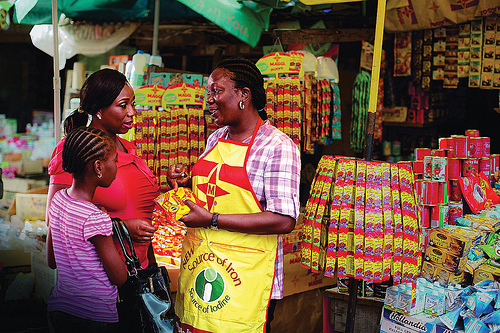Maggi, a seasoning cube invented by Julius Maggi in 1869, was based on his mission of “taste, enjoyment and sound nutrition combined to address the needs of the people”.
More than a century later, the brand has created thousands of jobs, empowered thousands of farmers and fed families in their millions.
Here are seven things you probably did not know about Maggi and the Nigerian people:
MAGGI HAS SUGAR
A lot has been said about the composition of Bouillon cubes in the Nigerian market, but as regards Maggi, that is within the realm of speculation. The cube is made from Soybean, iodised salt, chilli pepper, onions, corn starch, monosodium glutamate palm olein, colour caramel, lovage and – wait for it – sugar!.
Advertisement
MAGGI TACKLES BLINDNESS
According to the World Health Organisation (WHO), Vitamin A deficiency is the leading source of preventable blindness in children and night blindness in pregnant women. For this reason, sugar is in the makeup of Maggi, as a good source of vitamin A, which helps in tackling these two classes of blindness.
MAGGI PREVENTS BRAIN DAMAGE
Lack of iodine is the major cause of preventable brain damage, and severe iodine deficiency during pregnancy has the capacity to lead to mental retardation of infant or miscarriage, which is predominant in third world countries.
In tackling this menace in line with WHO standards, Nestle introduced iron and iodine-fortified Maggi brands, a good percentage of the recommended daily allowance of Iron and iodine.
Advertisement
IT EMPOWERS NIGERIAN FARMERS
Soybeans used in Maggi production are locally sourced from Nigerian farmers to the tune of 9,660 tonnes in 2014 alone. Aliyu Bele, one of the farmers from Bele community, Soba local government area of Kaduna state, testified to the claim.
He also said his children learn soybean farming after school due to the enormous benefits.
MAGGI IS BASED ON NIGERIAN CULTURE
Prior to the advent of Maggi in Nigeria, Nigerian women used special fermented seeds in seasoning their food. The Yorubas, Hausa and Igbo used iru, dawadawa and ogiri respectively – all from fermented seed.
This initiative from Nigeria’s rich culture is being used by Nestle, which ferments the Soybean in the production of Maggi.
Advertisement
80 MILLION CUBES OF MAGGI ARE PRODUCED DAILY
With a network of over 230,000 open market retailers and a chain of wholesalers and retailers, Nestle produces about 80 million cubes of Maggi per day in order to meet teeming needs.
Three days production can get one Maggi cube in the hand of every Nigerian, but for now, it reaches 18.3 million households in Nigeria. In 2014, 52.6 billion were consumed in central and west Africa.
NO NEED FOR SALT IF YOU ALREADY HAVE MAGGI
Strange! Maggi preaches moderation, as too much of those good ingredients can be damaging to your health. Once Maggi is used, you are advised to use little or no salt in cooking, due to presence of iodine and sodium in both.
According to the American Journal of Clinical nutrition, too much iodine can lead to sub-clinical hypothyroidism, which could lead to fatigue, cold intolerance, obesity and memory problems.
Advertisement
Too much sodium also has the capacity to cause high blood pressure and renal stones in the kidney, especially in adults.
As Nestle advises: food is medicine; medicine is food; eat in moderation.
Advertisement







